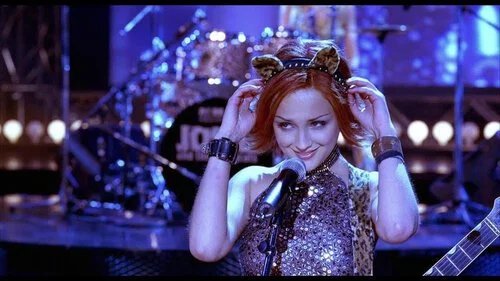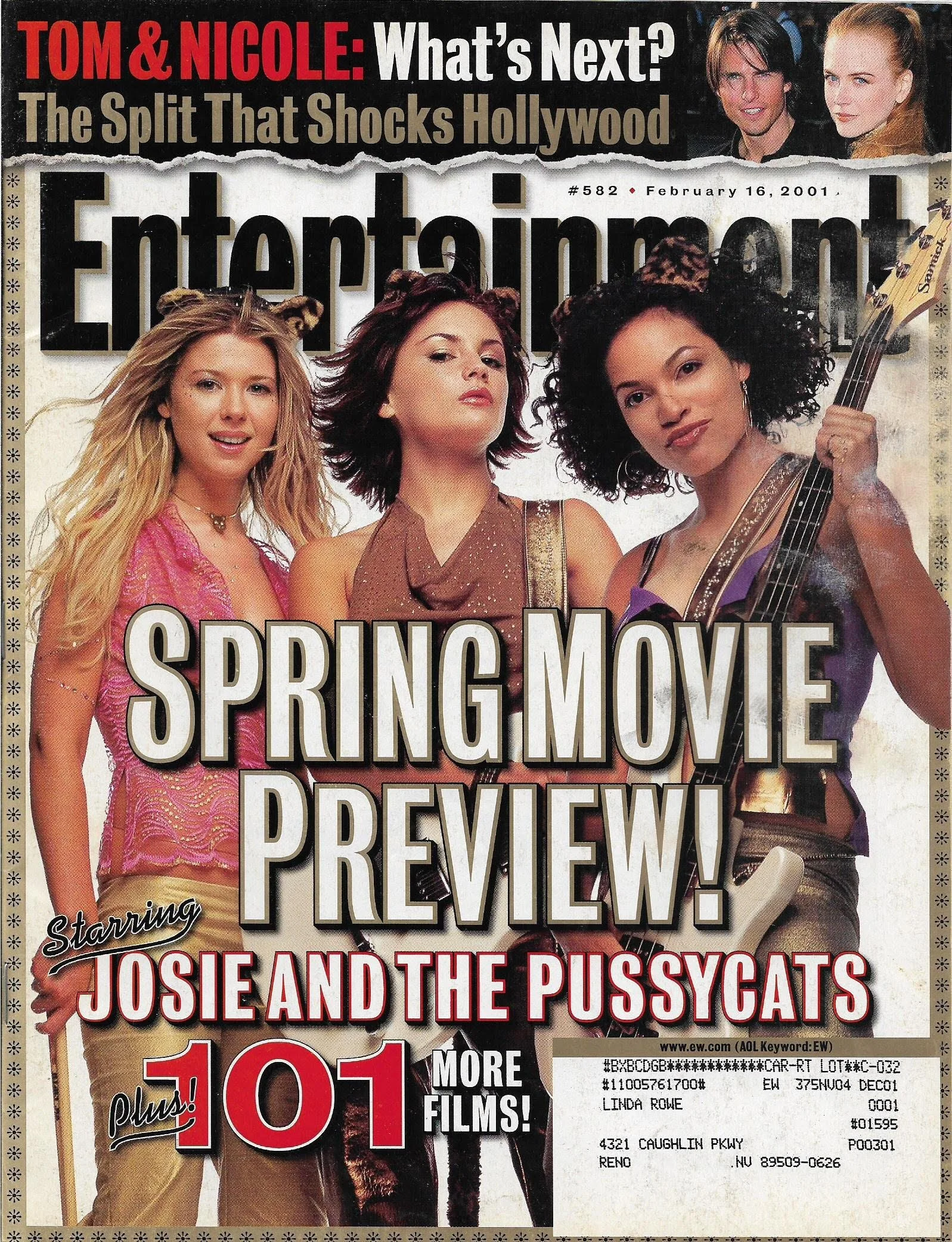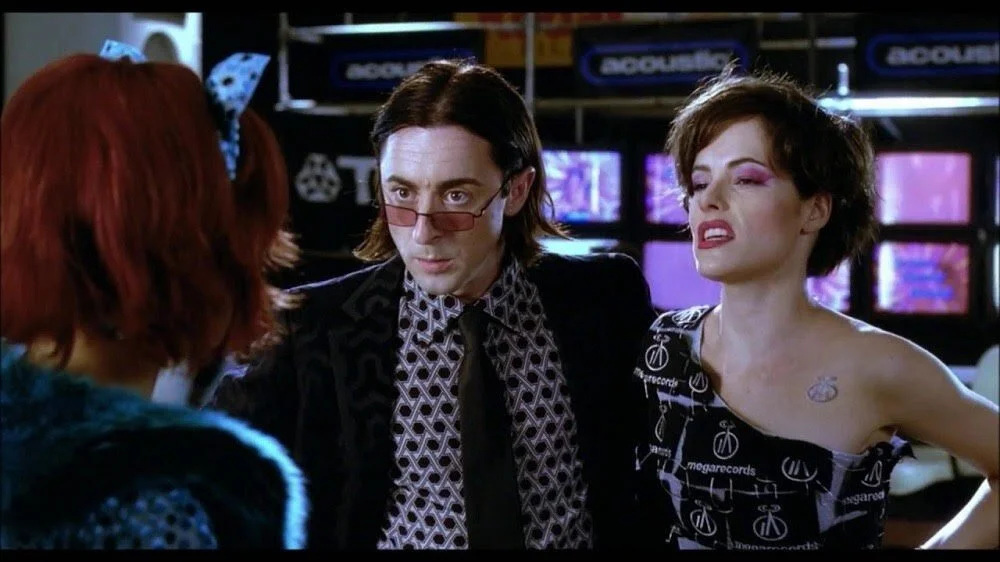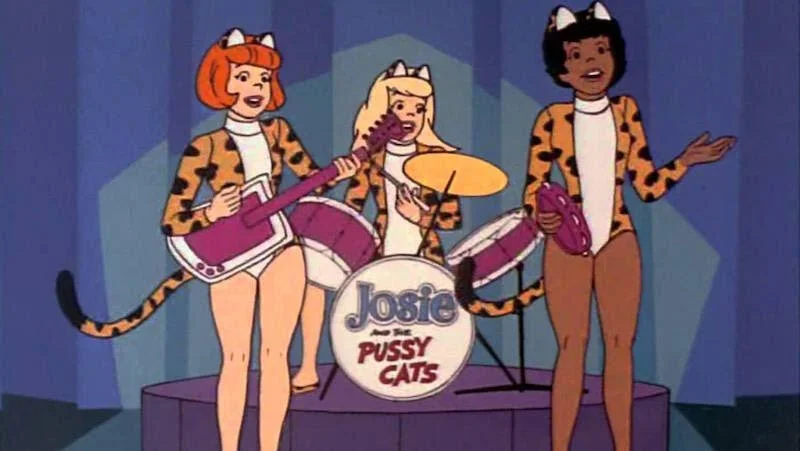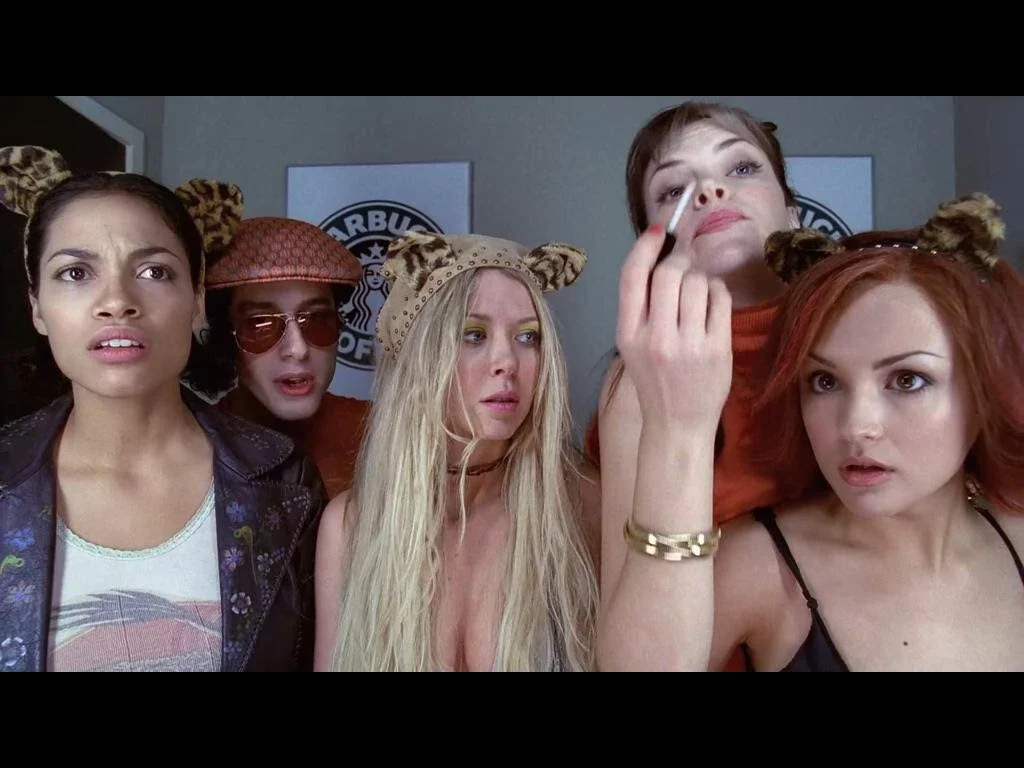Episode 5: Release — “It’s Dead On Arrival”: Josie And The Pussycats Bombs At The Box-Office
With a grim release date and the studio’s lack of confidence in the film, Josie And The Pussycats flops, further cementing its cult status writes Maria Lewis.
Josie And the Pussycats officially wraps its physical shoot in Vancouver, Canada, writers/directors Deborah Kaplan and Harry Elfont start putting the finishing touches on the film in post, and Kenny ‘Babyface’ Edmonds has the soundtrack polished to perfection. On paper everything is lining up for the film’s release – literally – as the Pussycats Rachael Leigh Cook, Tara Reid and Rosario Dawson cover Entertainment Weekly heralding the start of 2001’s spring release schedule. Yet behind the scenes, things weren’t going as well as the public-facing image would have you believe. Universal wasn’t feeling confident about their big, blockbuster version of Josie that’s supposed to be dropping the same theatrical year as Harry Potter And The Philosopher’s Stone, Lord Of The Rings: The Fellowship Of The Ring, Shrek, The Mummy Returns, Jurassic Park III and Pearl Harbour. This lack of confidence is reflected with an April 11 release date which – in the words of film writer and Dark Horizons founder Garth Franklin – was not great. “The main thing with Josie was that it was one of these early April releases,” he says. “Now this is at a time when mainly summer was the big movies: June, July, Memorial Day was usually the start. Then two years before that, The Mummy came out and changed everything: it made early May the time to start with go-to blockbusters, so April was a bit of a nothing month. It had become more of a dumping ground than it ever was before so if a film came out in April it was usually seen as something that ‘oh it might work, but we’re not entirely sure so we’re gonna be cautious with this one’.”
Josie And The Pussycats had a wild card up its sleeve though and that was girl power. Plus there was precedent for girl power being the thing that could exceed even the most negative of expectations. In August, 2000 – just over six months before Josie came out - two other female centric films had been released in cinemas: Coyote Ugly and Bring It On.
They both became hits, Bring It On more so than Coyote Ugly, but still. Bring It On had a legit tiny budget of $11M and grossed nearly $100M, going on to become a classic of the genre and spawning several sequels. Whereas Coyote Ugly’s budget was a little closer to Josie’s - $45M – and grossed $113M worldwide tomake it somewhat of a cult classic. This is all before they hit home entertainment, which was still a lucrative market back then in the age of Blockbuster. Even a movie that broke even at the box-office or came in well under estimates could make its budget back in home entertainment.
The other release of significance came out just a few months after Coyote Ugly and Bring It On: McG’s Charlie’s Angels reboot which fly-kicked into cinemas on November, 2000. The film hit big and on top of giving us Sam Rockwell dancing to Pharoahe Monch, it almost triples its $93M budget and becomes a phenomenon. It spawns a hit tie-in song from Destiny’s Child and parodies in the likes of Scary Movie2, which comes out the following year. It’s even so successful, Josie And The Pussycats makes a joke about it with a fake headline from Variety popping up during the Pussycats success montage as Pretend To Be Nice hits No.1: it reads “Barrymore, Diaz and Liu to play Pussycats in Josie movie!” All three of those movies starred women, were targeted at women, had engaging music and were aesthetically glossy: none of them reviewed well either, but were all able to go on to become box-office successes. Unfortunately, that wouldn’t be the case for Josie And The Pussycats as Letters To Cleo and Josie’s singing voice Kay Hanley found out firsthand. “I had spoken to Harry (Elfont) the week before and I was just like ‘this is so exciting!’,” she says. “I remember him not sounding that excited and I was like ‘that’s weird’. Apparently he had some data from some company that had said it wasn’t gonna open well at the box-office and, for me, I didn’t know anything about that stuff.”
Grim predications or not, the show must go on and the star-spangled premiere happened in Hollywood with the red-carpet pictures truly a time capsule to be treasured. There’s Alan Cumming in a powder blue blazer and a pre-Tiger King eyebrow ring, teen queen Amanda Bynes in all-pink leopard print with Frankie Muniz, ‘it boy’ Jesse Bradford, most of the cast of fellow Universal property American Pie, Dawson’s Creek’s Kerr Smith, and a who’s who of Hollywood dads with their daughters from Buffy’s very own Watcher Anthony Head (Giles!) to Kiefer Sutherland. It was a peak 2000s millennia celebration, but according to Kaplan and Elfont they knew that Josie And The Pussycats had flopped from the moment it hit theatres. “Like, an hour after it opened,” says Kaplan. “It’s Dead On Arrival … I think I went to a theatre in the Beverly Centre - that’s how long ago it was, there were still movie theatres in the Beverley Centre - and there were like five people in the theatre. I peeked my head in and I was like ‘okay, this is what we’re dealing with’ … It was like going to a funeral, it was literally like going to a funeral.” That reception couldn’t have been further from when their debut film had hit cinemas in 1998. “And our previous experience, Can’t Hardly Wait, which didn’t do incredibly well but that Friday night theatres were – I mean – people were sitting in the aisles,” says Elfont. “It was so packed and they cheered at the end of the movie.”
There was no cheering for Josie. The box-office numbers were just as grim, with the movie opening at number six during its week of release. “Josie And The Pussycats didn’t go that well at the box office, shall we say,” says Franklin, with Dark Horizons having covered the whole campaign in 2001. “This was a movie that cost probably more than what it should have for what it was. The budget estimates have varied depending on your sources, but it’s a figure between $22M and $39M at the time. Now most say it was $39M, but others say it was a bit cheaper than that. For a movie like that it needs to make about $70M to $80M to be a hit - it made $14M, which is not good. Now for comparison, that’s not too bad. There are worse films that have come out since and around that time and later that have done much worse than that. Rockstar with Mark Wahlberg came out the following year and that cost an extremely exorbitant $57M/$58M to make and I think it made about $19M/$20M – not much more than Josie did. So it’s not unheard of, but they were obviously trying for something like a Spice World: they wanted to make a movie that cost about $20M – $25M and that movie made $150M worldwide. They didn’t have the kind of caché of the Spice Girls, but they wanted like a $70m or $80M if they were gonna spend that much on that kind of film and they just didn’t get it.”
The other thing they didn’t get were good reviews or, heck, even kind ones. Legendary critic Rogert Ebert gave the film just half a star, saying: “Josie and the Pussycats are not dumber than the Spice Girls, but they're as dumb as the Spice Girls, which is dumb enough.” They had been Entertainment Weekly’s cover stars just a month earlier, but that didn’t save the Pussycats in the publication’s criticism of the movie. “In their junior-Playboy kitty ears, the Pussycats have little more grip as characters than they did as ’70s feline rockers spun off from the Archie comics. That’s the film’s principal drawback — sorry, but Rachael Leigh Cook is not the new Cameron Diaz. Cook has a withdrawn mannequin glumness that makes it look as if she’s had cosmetic surgery directly on her gene pool … Josie and the Pussycats is hardly a good movie, but it’s as flashy in its postmodern hard sell as a leopard-skin spandex tank top. Could Josie be the new Britney? Could the film be the new Bring It On? At the very least, it’s the new and improved Coyote Ugly. Call it Coyote Pretty.” The Village Voice - under the headline Kittens Rule, Boys Drool – gave one of the few positive reviews of both the film and the soundtrack, but even then … “And Kay’s vocals, recorded properly for the first time (= big budget and big-time producer/engineer) are the megaton bomb. On two or three cuts, she ends with a “yeoooooooWW!” just like those early Muffs things. Funny—she had a baby right before the soundtrack gig. Maybe puttin’ on some weight gave her extra vocal heft. (That’s what latter-day Debbie Harry swears by, anyway. Fat = phat, or something.)”
Hanley actually remembers that review in somewhat of a positive light: “Letters to Cleo were never really well reviewed during that time,” she says. “We were not critical darlings by any stretch. And I remember the first glowing review I ever got as a singer was in The Village Voice - I forget the guy’s name - he reviewed Josie And The Pussycats and he’s like ‘I love hearing Kay Hanley like this, it sounds like she just realised that someone’s gonna pay her’. It was the first time I really got paid for singing.” Gender and sexuality comes in to quite a few of those reviews, clearly, but the ones from female critics weren’t positive either. Not only was the film unpopular among critics, it was unpopular with audiences in the US and internationally it didn’t even get a chance. “Well, it was released by Universal domestically then MGM overseas and the thing I remember with that one was there was a bit of confusion between the two,” says Franklin. “It was a film that came out with not as much publicity as it should have for a film that size. There were some photos and some trailers that were released, but this was one of those movies where they really could have done more with the marketing - had the music videos out and have all that kind of stuff - they really didn’t exploit it as much as they should have. Consequently the failure wasn’t that unexpected, sadly. They played it theatrically here (in Australia) and it was one of those things where I went on the opening week and it was already shoved aside to the smaller cinema, so they didn’t have much faith in it internationally to play. Certainly almost all of the box office came from domestic – the international is not even reported on.”
One of the consistent criticisms of the film’s release was that Josie And The Pussycats was marketed at the wrong demo and it comes up over and over again in analysis about why the movie failed in 2001 but has succeeded in the intervening years: it was too old for an audience that was too young, or too young for an audience that was too old, an MTV movie when they needed a Nickelodeon one and vice versa. For Roswell, New Mexicowriter Alanna Bennett, the film hit her specifically right at the perfect time when she was 10-years old. “I think it’s because on rewatch and rewatch and rewatch it’s so layered in a way that I don’t think was acknowledged at the time,” she says. “I think when people saw it they thought ‘what is happening?’ Every line is hilarious, it has such an interesting point of view, and there’s not another movie like it so I think it’s just built for that cult status … It’s an odd movie, so I see why people didn’t necessarily get it at the time but I think it’s a crime that it wasn’t wildly successful, because you can see with the lasting power that it’s legacy has made up for that.” The other aspect was a lack of understand about what Josie was as a film and what it could be. “The narrative at the time was the film was a bit of a dud, but music films at that time weren’t seen as the big sort of juggernauts they can be at the moment,” says Franklin. “So something like Bohemian Rhapsody that came out last year – it was a music biopic, which is usually a genre that doesn’t really make much money anyway – but it gets turned into event programming. That’s one of the first times it has really been done, besides something like Grease which really broke through the generations.”
Another frequent critique was a distaste for the way the movie constantly broke the fourth wall: it was considered smug and went over a lot of people’s heads. So too the subliminal messaging storyline and all the meta jokes about the state of the music industry, things that we love now and have made the movie a cult classic. However, there were a lot people in showbusiness and the music industry who connected with that message … including Bono. “A couple of people did (get it),” says Elfont. “Again, the movie tanked. It felt like ‘oh jeez, nobody got it’ and the reviews were really mean and didn’t get it, a couple of reviewers got it, but the first time we heard of somebody getting it was when Deb went to a U2 show.” Kaplan nods enthusiastically: “Yeah, I went to see U2 and a friend of mine is friendly with Bono and got us all backstage. I don’t know how it even came up or I was introduced as that person, but he’s like ‘I love that movie, I totally got it!’ He knew exactly what we were saying, he totally got the satire, he totally felt it, it was like ‘oh okay’.” Although it had bombed at the box-office, Bono’s support was an unexpected silver lining for the duo. “You said at the time that he said people were going to see it and finally understand what was going on in the music business,” laughs Elfont. “So for a couple of years all we had was ‘well at least Bono got it’. That was our only solace.”
Josie And The Pussycats was a flop, yes, but it was one of many big flops that year: Glitter and Freddy Got Fingered also came out in 2001 and bombed bigtime (but in Glitter’s defence, the Mariah Carey star vehicle was released on September 11, 2001). In fact, Josie And The Pussycats bombing had a big snowball effect for the rest of a planned Archie Comics cinematic universe, which might have been for the best. “As much as people seem to love Josie And The Pussycats now it was a massive bomb,” says comic book historian and author of Betty and Veronica: Riverdale’s Leading LadiesTim Hanley. “Archie, the powers that be at Archie at the time, decide we’re going to take control of our properties now. They created Archie Comics Entertainment, they brought in some people who were not comics professionals but entertainment professionals generally, and decide ‘we’re going to develop our own properties ourselves’. One of the big ones was they very quickly sold a Betty and Veronica movie to Miramax, so if you go back and read those statements from the time you get a lot of glowing words about Veronica from Harvey Weinstein which is … off putting, these days. That movie never happened, but it was a big deal for them at the time. They had an internal memo that was their massive, five-year plan: they wanted an Archie movie, they wanted a Jughead movie, they had tonnes of plans that never really came together.” The Big Yikes Energy of a Betty and Veronica movie from convicted rapist Harvey Weinstein is hard to match, but that was only just the tip of Archie’s big multimedia plan. “Another big part of it was Riverdale Starz, which would be like an American Idol style talent show to recreate The Archies as a band but also for television stuff and concerts,” says Hanley. “If you remember S Club 7 from the early 2000s, which was a band but also a TV show, that’s kind of the direction they were going. They also advertised in the comics for about two years and it never happened so … they tried to take control of everything, nothing ever came of it, but the seeds of that you can see all these years later with Riverdale and The Chilling Adventures Of Sabrina and the new Katy Keene show. At the time though, not super successful for them.”
This article is a written version of the Josie and the Podcats episode Release. Josie And The Podcats is a limited podcast series hosted by best-selling author, screenwriter and journalist Maria Lewis, and produced by Blake Howard of One Heat Minute. New episodes release every Sunday, with bonus episodes during the week.
